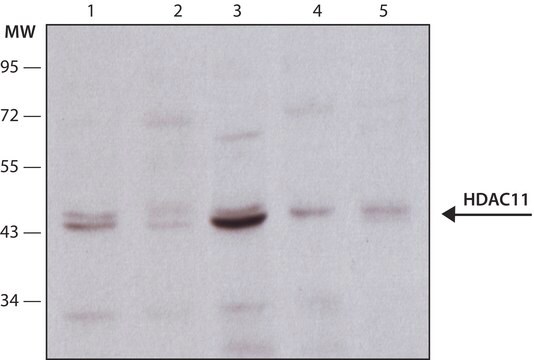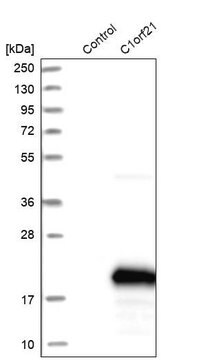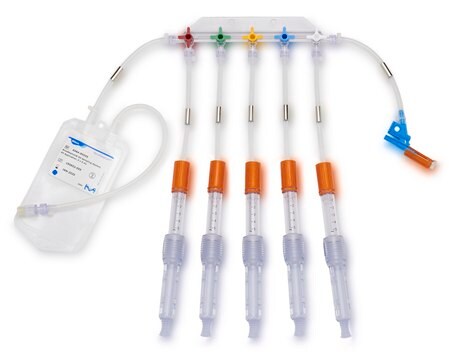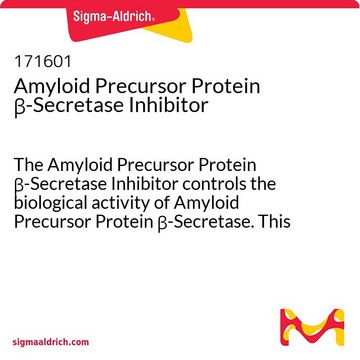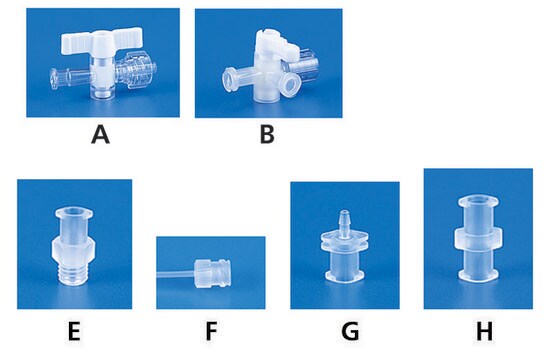GS76
GST O2-2, Recombinant Human
Synonym(e):
glutathione S-transferase omega 2
Anmeldenzur Ansicht organisationsspezifischer und vertraglich vereinbarter Preise
Alle Fotos(1)
About This Item
UNSPSC-Code:
12352200
NACRES:
NA.26
Empfohlene Produkte
Biologische Quelle
human
Qualitätsniveau
Rekombinant
expressed in E. coli
Form
frozen liquid
Lagertemp.
−70°C
Angaben zum Gen
human ... GSTO2(119391)
Biochem./physiol. Wirkung
Glutathione S-transferase omega 1 (GSTO2) is an enzyme that in humans is encoded by the GSTO2 gene. Glutathione S-transferases (GSTs) are a family of enzymes that play an important role in detoxification by catalyzing the conjugation of many hydrophobic and electrophilic compounds with reduced glutathione. Based on their biochemical, immunologic, and structural properties, cytosolic and membrane-bound forms of glutathione S-transferase are encoded by two distinct supergene families. At present, eight distinct classes of the soluble cytoplasmic mammalian glutathione S-transferases have been identified: alpha, kappa, mu, omega, pi, sigma, theta and zeta. The GSTs are thought to function in xenobiotic metabolism and play a role in susceptibility to cancer, and other diseases.
The protein encoded by this gene is an omega class glutathione S-transferase (GST). GSTs are involved in the metabolism of xenobiotics and carcinogens. Four transcript variants encoding different isoforms have been found for this gene.
Lagerung und Haltbarkeit
The enzyme should be used by the end-user customer within 1 year of receipt.
Lagerklassenschlüssel
10 - Combustible liquids
Flammpunkt (°F)
Not applicable
Flammpunkt (°C)
Not applicable
Hier finden Sie alle aktuellen Versionen:
Analysenzertifikate (COA)
Lot/Batch Number
It looks like we've run into a problem, but you can still download Certificates of Analysis from our Dokumente section.
Wenn Sie Hilfe benötigen, wenden Sie sich bitte an Kundensupport
Besitzen Sie dieses Produkt bereits?
In der Dokumentenbibliothek finden Sie die Dokumentation zu den Produkten, die Sie kürzlich erworben haben.
Zhixin Wang et al.
Tumour biology : the journal of the International Society for Oncodevelopmental Biology and Medicine, 36(8), 6463-6469 (2015-04-04)
Some genetic alterations of glutathione S-transferase omega 2 (GSTO2) have been reported to increase the risk of many malignancies, including hepatocellular carcinoma (HCC); however, their prognostic capability remained unresolved in HCC patients treated with transarterial chemoembolization (TACE). To fill this
Miroslav Stamenkovic et al.
Clinical & experimental ophthalmology, 42(3), 277-283 (2013-08-10)
Glutathione S-transferase omega-1 and 2 have a unique range of enzymatic activities, including the regeneration of ascorbate by their dehydroascorbate reductase activities. Because these enzymes could have a protective role from oxidative damage in the lens, the question of whether
Nioosha Nekooie-Marnany et al.
Molecular biology reports, 40(8), 4857-4860 (2013-05-08)
Acute renal allograft rejection remains an important problem following kidney transplantation. Several immunological and non-immunological factors intervene in renal graft rejection. Glutathione S-transferase super family is one of the important enzymes for biotransformation of both exogenous and endogenous xenobiotic compounds
D Rezazadeh et al.
International journal of laboratory hematology, 37(4), 530-535 (2015-03-03)
Acute lymphoblastic leukemia (ALL) is the most prevalent malignancy among children and makes up 23% of total childhood cancers worldwide. Pre-B ALL is one of the most common ALLs, comprising about 80% of childhood cases. A variety of genes are
Mohammad Masoudi et al.
Molecular biology reports, 38(7), 4309-4313 (2010-11-30)
Expression pattern analysis has been revealed that glutathione S-transferase omega 2 (GSTO2, a member of class omega) is ubiquitously expressed. Over expression of GSTO2 induced apoptosis. The gene encoding GSTO2 was localized to human chromosome 10q24.3, a region that may
Unser Team von Wissenschaftlern verfügt über Erfahrung in allen Forschungsbereichen einschließlich Life Science, Materialwissenschaften, chemischer Synthese, Chromatographie, Analytik und vielen mehr..
Setzen Sie sich mit dem technischen Dienst in Verbindung.

